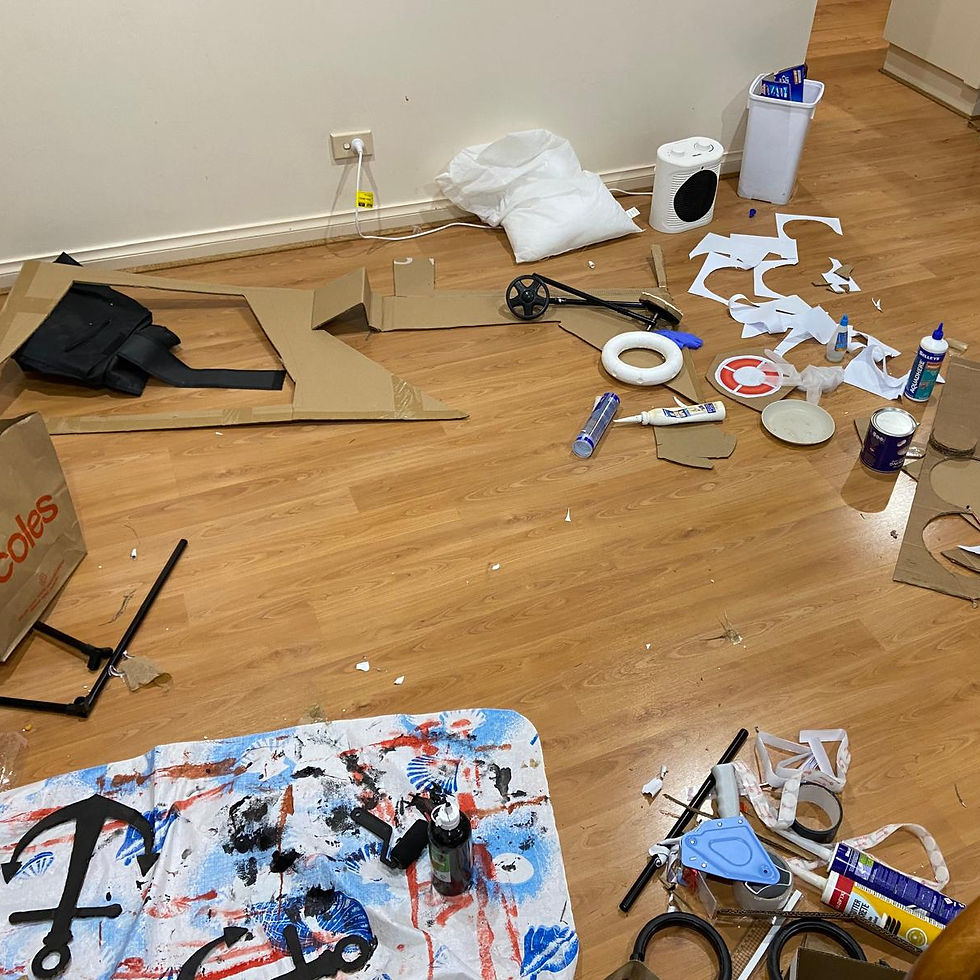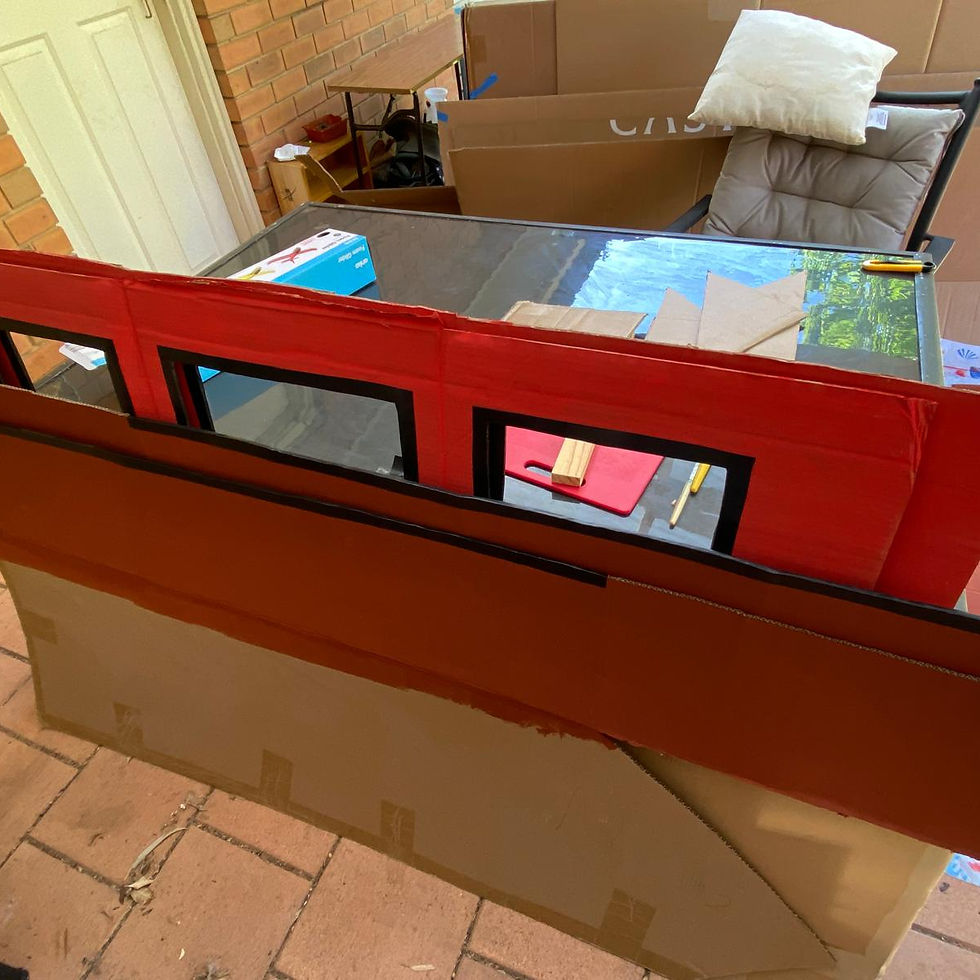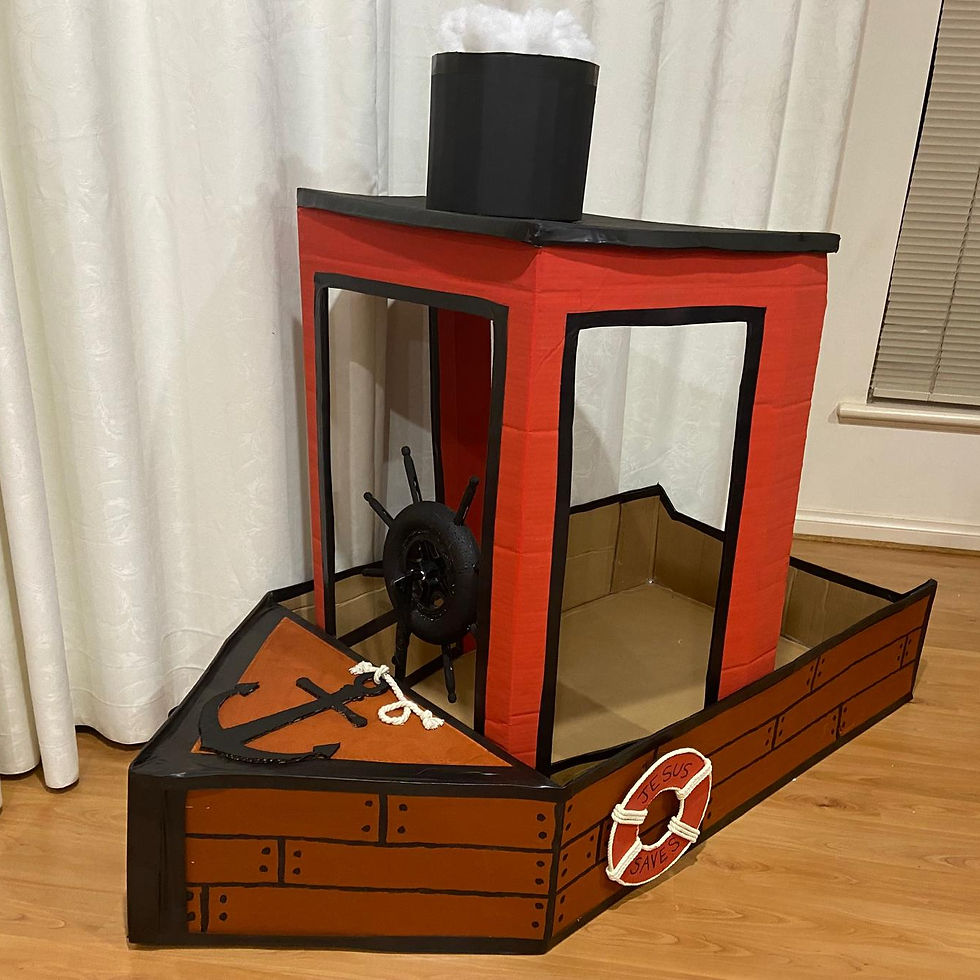Children's ministry Q &A with Melodie
- Naomi & Melodie
- Feb 20, 2025
- 9 min read
Updated: Feb 21, 2025
“But Jesus said, Suffer little children, and forbid them not, to come unto me: for of such is the kingdom of heaven.”
Matthew 19:14 [KJV]

Children's ministry, Church Camp 2024
I was recently chatting to my church’s Sunday School coordinator. “You know,” she said, “the most common question I get is, what do you actually do in Sunday School?”
Well, it is important to understand how ministries for children should function, even if you don’t have children involved. They are church ministries and typically have mostly female helpers and teachers, providing many opportunities for women to serve in this area.
So let me introduce Melodie. Melodie is my church’s Sunday School Coordinator, and a gifted and tireless ministry worker, mentor and friend. She helped with her first children’s camp at the age of sixteen and has extensive experience teaching and organising children’s ministries, such as Sunday Schools, Bible Clubs, and children’s camps, in four Australian states.
Let’s start with an important question, how do children-specific ministries further a church’s ministry aims?
It's part of the Great Commission. We are seeking to reach children with the Gospel while their hearts are soft. Hearts often harden as people get older. And if you don't reach them, somebody else will. They've got all kinds of other influences on their hearts and minds and lives, especially the ones that go to school or don’t have Godly parents. Jesus said, “Suffer little children …to come unto me” (Matthew 19:14a). He saw teaching the children as a vital part of His ministry, even when the disciples wanted to stop it.
A Sunday School should never be in competition with other church ministries. You need to have a right relationship with the Pastor, and you need the prayer and financial support of the church. I think that if the Sunday School doesn’t have much communication with the church congregation, they can get the idea that all you’re doing is babysitting or running a play club. So, sharing prayer requests, giving ministry updates, or having the children sing or recite verses in church gives the congregation an opportunity to see what’s happening.
Children’s ministry isn’t in competition with parents either. Yes, it is the parents’ job to teach the children, but I know from my own growing up that it's very good to hear it from others as well.
What are important aspects to include in a Sunday School program?
It's good to have a singing time. It gives the children an opportunity to learn Christian songs that will go through their heads throughout the week. We also like to take up a missionary offering. It’s teaching them at that age to give, and that it's not just about what the parents are doing, but they can give to the missionaries themselves. You also want to teach a memory verse. I think that's super important and the more that you do to teach it in the lesson time, the better they memorise it during the week.
Then your Bible lesson needs to be your main focus. All the other things should complement the Bible lesson. It’s important that children see the Bible open when you teach. It’s good for them to open the Bible themselves. We want them to know we are teaching them God’s words, not our words.
I also like the idea of a story, whether it's a missionary story, a character story or an ongoing story where they need to come back and hear the next part next week. That way they hear of real-life people who have lived for the Lord or done something for the Lord.
If you have time, you can include a craft, colouring picture, or game. They should fit the theme though. You don't want to just do a random Simon Says or a game that they might play at school that has no application.
Do you have any tips on how to keep children engaged during a session?
If you just talk for the whole lesson, then almost always you will lose them. They are not little adults. Get them to stand or do actions while singing, or do an activity for the memory verse. You can also include an object lesson, puppets or relevant science experiment. Have a clear lesson aim, something that will get to their heart.
Visuals are also important. Freebibleimages.com has some good illustrations but choose carefully. We also have a set of beautiful Betty Lukins felt board images. If you can draw, go for it! One of my Sunday school teachers could draw. It was all stick figures, but Jesus was a particular shaped stick figure, and if he was doing a crowd, you'd just see all these lines and circles and next thing there is a heap of people there.
It's also good to research how children learn. They only remember a small portion of what they hear, a small portion of what they see, and a small portion of what they do. But if you combine hearing, seeing and doing, they remember much more.
Remember too, God loves the children more than we do. It’s easy to want to control the outcome, but it’s His plan, His purpose, His time. He will ensure the children learn what He wants them too.
What are some character qualities that make an effective children’s ministry worker?
They need to walk with the Lord. Faithfulness is a big thing, because children watch, and they see if the Sunday school teacher only comes to church once a week, but Pastor teaches we should come to all three services.
Children’s ministry workers need to be flexible, and willing to work hard. You need to take the time to prepare. Some of the lessons are convicting! You think, “How am I going to teach this to the children, I’m struggling to have victory with this myself?” The earlier you start preparing, the longer you’ve got for the message to penetrate your heart, and then you will teach it better.
You need a love for children. Children will know if you don’t like them. So be prayerful and ask the Lord to give you that heart.
You need to be a good leader because you need to lead the children. But you also have to be a good follower, because you're following the Pastor and what he's looking for in the Sunday school. You also need to work well with others because Sunday school is never an isolated ministry.
The Lord can develop these character traits over time if you are willing to let Him. Be teachable and learn from your mistakes. You're never going to do a perfect job of Sunday school. You might think “I've got this wonderful plan”, and then it all falls in a heap. I think that happens so that we really learn to trust the Lord!
If someone was starting a children’s ministry for the first time, what advice would you give them?
Read books. Find out some names of people who are already teaching or who've been teaching for a long time and get in contact with them. Whenever I meet somebody who's a Sunday school teacher, I'll just naturally start asking them, what do you do with this and how do you do that? You learn a lot by asking questions.
You need to be in contact with the Pastor. It's never wise for someone to just randomly start up a Sunday school. What often happens, is that the Pastor notices your gift or interest, and asks you to serve in children’s ministry.
You also need to find a curriculum. You may decide to write all of your own lessons, but keep in mind that this takes a greater time investment. Don't think that you have to use a curriculum exactly as it is. And definitely don't read the lesson straight from a book!
There are also some legal regulations and policies to bear in mind. You should have a form for parents, for important details such as parent phone numbers and children’s birthdates. It starts that conversation with the parents, and I leave a space for details like allergies or special needs.
It's also nice to do some kind of attendance board to get the children excited about coming.
Oh, and get a Cricut cutting machine! It’s not a necessity, but it’s such a blessing when it comes to crafts and attendance boards! I do get a bit carried away since I no longer have to trace every piece of card and then cut it out by hand. Who else makes koalas to go on lollipops?
How important is it to engage with parents? How might you do this?
The form is the start. I will then message them, so they have my phone number. I’ll let them know about term dates. I also try and do home visits, especially if the children’s families aren’t regular attendees. When you see the child in their home environment, it helps to build the relationship. Be sure to be appropriate, especially if it is a one parent situation.
Communicate with the parents about how the child is doing in class. If you have a situation where you’ve had to communicate that a child is not participating well, be sure to let them know when their child is now participating well.
Discussing issues with parents is difficult. There is an art to it, I don’t know I’ve quite found the balance yet. It’s also being prayerful about how you do it. You don't want the parent or the child to decide that they no longer want to attend.
How do you manage issues with children’s behaviour in Sunday School?
Have realistic expectations about the children. In children, their sin is very obvious. As adults, we learn to hide it. If I remember that I’ve still got the same sin problems as they do, then it’s easier not to be too harsh with them.
Some places have a list of classroom rules. You can move a child during class too. It's nice for children to sit amongst their friends if they can behave right. Sometimes a brief reminder at the start of class not to talk to one another does not go astray.
Keep your face looking positive, even when the children are testing your patience. They have to know you're serious, but if you really drill down on them, then that just shuts them down and you have trouble trying to build rapport with them. It’s easy to say to the child, “You're doing this, and I don't like it.” But I've noticed when I say, “Do you think that's what Jesus would want you to do?” they start to think, and sometimes they realise, yes, I know Jesus doesn’t want me to do that.
And if a helper is sitting amongst the children they can move around and sort out issues. If there is a continuing issue, you might need to give a warning about talking to their parents.
Remember, praise for doing the right thing can often have greater benefit than pointing out all of the wrong things.
Does today’s extensive digital device use pose new challenges to children’s ministries?
Children certainly aren’t used to sitting as long. They can be quick to go, oh that's boring, just because it’s not techie.
Children’s minds can also go in places you don’t expect if they have sick stuff in their minds, especially those from unsaved homes. They might start snickering when you talk about a Bible story involving a man and woman because they have too much understanding for their age. Or if you have free time during colouring or doing a craft, before you know it, they are talking about magic, or full-on Satanic things they see online, or even things from their home life. Sometimes you have to say, “We’re not going to talk about that here.” Sometimes you might have to let the Pastor know that a certain topic came up. But, thankfully, I haven’t had anything come up that’s required a mandatory police report.
Some people are terrified of working in children’s ministries because they are worried about accusations being made against them. How do you deal with those?
You need trust the Lord and seek to be above reproach in the way you behave. Make sure there is more than one adult in the room and, if possible, have a glass door or glass panel in the door. Be careful about physical conduct with children in your care. A high five or hand shake can be an appropriate way to encourage them. Your church should have a policy with a moral code of behaviour with some guidelines for ministry workers.
If an accusation is made, you need to talk to the Pastor straight away and let him know what has been said. Recall as much as possible of what you remember of the situation. And then the other teacher is going to have to be spoken to as well, to see what they remember. There may be other children who don't necessarily need to know that an accusation was made, but might be able to tell what happened on a particular day.
Any final thoughts?
Remember that it’s the Lord’s work. There is a lot of work in it, but it's worth it. I love it. You have no idea how the Lord's going to use something or someone. Some children I taught are now in full-time ministry. There is so much potential in children, and we can be just a little part of God’s plan for their lives.
Bonus content: Behind the scenes when your Sunday School coordinator asks you and your sister to build a boat for church camp 2024!










Comments